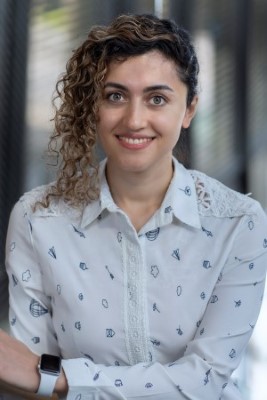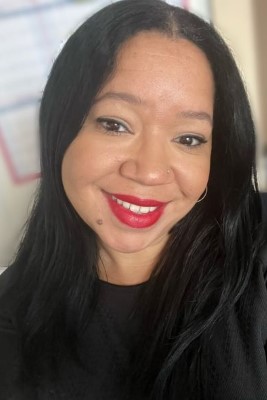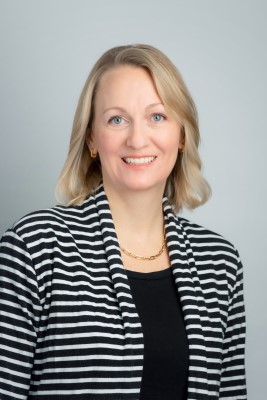Meet some of the women making SickKids science possible
Summary:
On International Day of Women and Girls in Science, meet four women whose work behind-the-scenes at SickKids helps support child health research.
It takes a network of dedicated individuals to help turn a research question into the latest scientific breakthrough. At The Hospital for Sick Children (SickKids), there is a community of support staff that scientists and research teams depend on to enable their research, from specialists in administration and infrastructure to policy and information technology.
In celebration of the International Day of Women and Girls in Science, we heard from four women working in valuable roles across SickKids, to learn how their role is supporting the latest advancements in child health research.

Shary Mahdavi
Laboratory Operations & Project Coordinator, Facilities Infrastructure & Space Management, Research Operations
What do you do at SickKids?
I work in close collaboration with facility operations and senior coordinators on infrastructure related projects, which involves liaising the needs and requirements of scientists with all the other invested partners working on the projects. I manage assignments which balance day-to-day operational needs of our research community and help socialize lab policies and safety practices among researchers. I am also part of an amazing program called Peer Support at SickKids, which provides support for staff during difficult times.
What drew you to this career?
It has always been an aspiration of mine to pursue a career in science. During my PhD, I was also a lab manager, and this added responsibility provided a great opportunity for me to be involved in activities beyond the bench. Gaining a broader outlook while working both on and off the bench inspired me to pursue an alternate career opportunity, whereby I could continue contributing to science in a supportive role by providing expertise in laboratory operations.
How does your work enable research excellence at SickKids?
By promoting awareness of and advising researchers on lab policies and best safety practices, my team and I help ensure that researchers are equipped with the infrastructural requirements for their work, which will ultimately enable higher-quality research.
What is the best part of your job?
I enjoy collaborating with people in different academic and professional positions. I am also involved in multiple projects targeting different objectives, so I encounter new challenges daily which give me more opportunities to learn and enable me to grow in my role.
My advice to anyone considering a career as a project coordinator is to be prepared to face new challenges and feel confident that you will find a solution. This is a demanding but very fulfilling position which will help you to develop so many personal and professional skills.

Nadine Francis
Administrative Assistant at the Centre for Global Child Health, Child Health Evaluative Sciences and Infectious Diseases
Working with Dr. Daniel Roth, Dr. Shaun Morris, Dr. Diego Bassani and the C-GCH Seminar Committee.
What do you do at SickKids?
I am the central administrative resource for three research senior scientists and their staff. My day-to-day activities include coordinating meetings both locally and internationally, finance reimbursements and invoicing, and lab supply ordering for international projects. I also assist with coordinating the Centre for Global Child Health Weekly Seminar Series. I also help contribute to grant submissions and support recruitment coordination for new staff, fellows and students. Each day in administration can present a different set of tasks, and I am always ready for what’s to come.
What drew you to this career?
Working in administration provides a lot of versatility. Having a strong customer service background, I knew working in the administration field would be a good fit for me and SickKids has a community that I wanted to be a part of.
How does your work enable research excellence at SickKids?
There are many components to running an effective research portfolio. I help support collaboration, which is vital not only with other SickKids colleagues but with working partners globally. It takes a team to run projects and administration is such a huge part of what glues them together.
What is the best part of your job?
The best part of the job is working with a wonderful group of people that contributes so much of their knowledge, research and expertise to child health globally and at SickKids. I have worked with so many people throughout the years and from all parts of the world! I am proud to be part of ‘women in science who support science’.

Shauna Kirk
Program Manager and Clinical Trials Navigator, Clinical Research Services
What do you do at SickKids?
I provide leadership for the Streamlined Pathway for Research Initiation (SPRINT) – a standardized pathway for research teams to secure study approvals at SickKids. Through my work, I help support research teams as they navigate the various regulatory, ethical and institutional requirements that are critical to the development and implementation of new clinical research studies. I consult and collaborate with study teams, Research Operations staff and the many clinical areas that support research to update and create resources and services to improve the way that researchers at SickKids navigate starting a study.
What drew you to this career?
I was drawn to a career in clinical research because I wanted to use my scientific background to help people. After gaining experience in various roles in both academic and industry settings, I wanted to use the knowledge I had gained in those roles at an operational level to support research teams across the institution.
How does your work enable research excellence at SickKids?
By doing my part to streamline and improve the way that researchers at SickKids navigate study start-up, quality clinical trials can start more effectively and efficiently. This means researchers spend less time on administrative tasks and can spend more time focused on the science and their patients.
What is the best part of your job?
I love that each day is different and brings new challenges and opportunities for improvement. I also get to collaborate with so many people across the organization who bring a different perspective to each project and initiative, but have a shared passion for the greater goal of helping children.
Clinical research is an exciting field to be in and there are many different roles and career paths that all contribute to the important work being done. If you’re not sure what you want to do as a career, be open to a broad range of positions and experiences as they’ll help you gain knowledge, build new skills and find what you’re passionate about.

Roshni K P
Systems Analyst for High Performance Computing, Research Information Technology (IT)
What do you do at SickKids?
I am a systems administrator supporting SickKids’ High Performance Computing (HPC) infrastructure. I help monitor and maintain all computer servers, build and install new systems and applications, and manage researchers’ data stored on a large scale in the computer and archive storages.
What drew you to this career?
Although my educational background was in electronics and communication, I was always interested in computer science. Having networking courses during my bachelor’s degree enabled me to break into this field and my strong analytical skills helped me thrive in this role.
How does your work enable research excellence at SickKids?
As a systems administrator, we help ensure that users are provided with the right tools to conduct their research activity as well as process and store the research data in a secure, high performance storage system. In addition to this, HPC allows us to run complex and advanced applications at the same time in a quick and efficient manner, while helping to ensure researchers are following SickKids’ privacy, security and retention policies.
What is the best part of your job?
Troubleshooting user reported issues is a day-to-day task in my role and I really enjoy the analytical process involved with finding the root cause and coming up with a solution to help researchers have the technical support they need to conduct their research. This role requires good attention to detail and is one of the aspects of the job that I really enjoy.
If you’re looking for a career with plenty of opportunities and growth and are interested in handling server and system networks, then this career would be a perfect choice for you!

